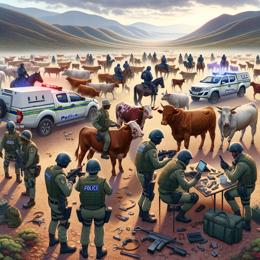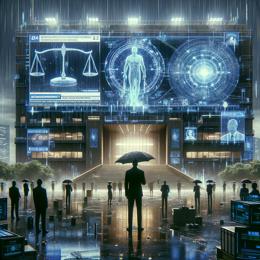Image created by AI
South Africa's Copyright Amendment Bill Passes Parliament Amid Contentious Debate
In a significant move that has stirred up the creative landscape of South Africa, Parliament has given its assent to the much-debated Copyright Amendment Bill, with Thursday marking a pivotal moment in the country's legislative history. Passed by the National Assembly, the bill has been a point of contention among various stakeholders within the creative industries, who maintain that the legislation could potentially undermine the sanctity of copyrights and deter the economic welfare of artists and creators. Despite facing stark opposition from parties including the Economic Freedom Fighters, Democratic Alliance, the African Christian Democratic Party, and the Freedom Front Plus, the bill is now en route to President Cyril Ramaphosa for his signature.
The bill's inception traces back to 2017 when the Department of Trade and Industry brought it to Parliament with the intention of revamping copyright laws dating back to 1978. However, what intended to modernize has become a polarizer; organizations representing domestic and international authors stand firm in their belief that the proposed amendments could dilute copyright protection and put creators at a financial disadvantage.
Legal experts, too, are critically analyzing the consequences of the bill. Carla Collett, a partner at the law firm Webber Wentzel, acknowledges the bill’s "noble aims" but contends that its practical implications fall short of its objectives. Highlighting the bill's problematic nature, Collett anticipates it to be the source of legal challenges from across the creative sector.
The bill's controversial aspects include a 25-year limit on the assignment of rights, after which ownership reverts to the original creator. This provision has been met with a lukewarm reception as it raises questions on the long-term valuation and marketability of copyrighted works. Furthermore, the introduction of the fair-use principle is likely to ignite debates over its execution, burdening copyright holders with the onerous task of justifying the exclusion of their work from fair use – a scenario that most likely culminates in costly legal battles.
The backlash is not merely domestic; global voices such as Gadi Oron, director-general of CISAC, have openly criticized the bill's capacity to instigate marketplace uncertainty. The consequence, as foreseen by critics, is a legal quagmire that neither benefits creators nor users, and does little to foster a nurturing environment for artistic and intellectual creation.
Notwithstanding, the bill does not lack entirety in support. A vital provision that has garnered applause is the section tailored for individuals with disabilities. The legislation paves the way for the conversion of copyrighted materials into accessible formats like braille, large print, and audio, which organizations like Blind SA & SECTION27 have heralded as a critical step towards ending the so-called "book famine."
The bill's progress signifies a contentious crossroads for South Africa's creative realm. Even as it reaches the hands of President Ramaphosa, who had previously returned a version for reconsideration over constitutional concerns, the debate signifies the intricate balance between protecting the fruits of creativity and adapting to the ever-evolving digital landscape where accessibility and fair use are becoming increasingly prominent.
Whether the bill will become a cornerstone of South African copyright law or an anchor dragging down the prospects of its creative industries remains contingent on not just the President's decision but also the legal interpretations and challenges that are expected to ensue. The forthcoming days are thus critical, as they are likely to shape not just the legislation itself but the broader creative ethos of the nation.










